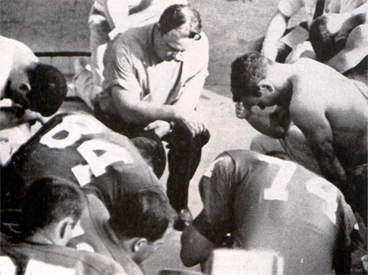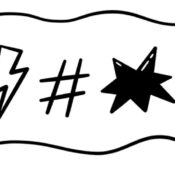It’s a story that refuses to lie down and be quiet, even half a century later.
In 1963, James Wallace “Wally” Butts Jr., former coach of the University of Georgia’s football team, sued Curtis Publishing, the Post’s parent company, for libel. The case went all the way to the Supreme Court, which ruled a 5–4 decision against Curtis Publishing. Fifty years later, there is growing doubt that it was the right decision.
To understand the doubt, you need to know the background of what the Post claimed was the most shocking sports story since the Chicago Black Sox scandal — a story that began with an overheard phone call, and ended by damaging the credibility of America’s most popular magazine.
On September 13, 1962, George Burnett, an insurance salesman in Atlanta, called a friend at a local public relations firm. As sometimes happened in those days, the phone lines “cross-connected.” Instead of his friend’s voice, Burnett heard a telephone operator identify two famous college football coaches: One was Butts, the athletic director and former coach at the University of Georgia; the other was Paul “Bear” Bryant, coach at the University of Alabama.
Instead of hanging up or announcing his presence, Burnett remained on the line and listened. Over the next 15 minutes, according to what Burnett told the Post, he heard Butts give Bryant details about Georgia’s plays, strategies, and particular formations the team would use against Alabama in the opening game, just nine days away.
Burnett feverishly took notes. When the conversation was over, he had about six pages in all.
After the coaches hung up, Burnett redialed the number. This time the call didn’t get crossed over; he reached his friend at the public relations firm. His friend told him that Butts was, in fact, at the firm and using a phone in a back office.
The next week, Alabama defeated Georgia, to no one’s surprise. Bryant’s team had been widely expected to win. What was unusual was the score: 35-0. Few gamblers would have bet on the winning team; most of the betting action would concern the difference between the teams’ scores. Prior to the game, the point spread had been a mere 17-14 in favor of Alabama. A gambler who knew Alabama secretly had an edge over Georgia could have made a fortune.
The lopsided win bothered Burnett. And he mentioned the matter to a friend, who passed it on to the new Georgia coach, who informed the University of Georgia’s administrators. They asked Butts about the incident. Butts didn’t deny the charge. He admitted to discussing Georgia’s plays with Bryant but said the incident had been misinterpreted. The next day, Butts resigned.
The university’s regents then called in Burnett and grilled him on what he’d heard. They brought up the fact that Burnett might not be a credible witness because he was on probation for writing bad checks. Perhaps he was hoping to gain by making these charges.
Burnett left the meeting convinced the university was going to dispose of the problem by discrediting him. Expecting to face an accusation of slander from Butts, Burnett spoke with his attorney, who suggested he take his story to The Saturday Evening Post.
“The Story of a College Football Fix” appeared in the March 23, 1963, issue. Three days later, Butts sued Curtis Publishing for $10 million.
The case was heard in the Atlanta federal court, where a jury awarded Butts $60,000 in general damages and $3 million in punitive damages. Stunned, Curtis Publishing appealed the verdict, but the Fifth Circuit Court upheld the decision.
Curtis appealed again, believing it could get a favorable hearing in the U.S. Supreme Court, which had recently handed down an important decision concerning the rules of libel. In that case, L.B. Sullivan, the public affairs commissioner of Montgomery, Alabama, had sued The New York Times Company for libel after the paper ran an advertisement for Martin Luther King Jr.’s legal defense fund. He believed its criticism of the city’s police had defamed him personally. But the Supreme Court ruled unanimously in favor of the Times. In the ruling, Justice Hugo Black explained that malice “even as defined by the court, is an elusive, abstract concept, hard to prove and hard to disprove.” In this instance, the Supreme Court declared that a public official could not be libeled unless a publication showed “actual malice” — a statement with reckless disregard for the truth.
Unfortunately for Curtis Publishing, the Supreme Court decided the Post had indeed acted with reckless disregard and upheld the lower court’s decision for Butts. But the award of $3 million was reduced, and eventually Butts accepted $460,000.
Over the past 50 years, journalists who have revisited the case wonder how the Post managed to lose. The reason might be one or several of the following:
- Butts’ lawyer was skillful in diverting suspicion away from his client.
- The Post‘s attorney knew little about football, while Butts’ attorney knew much and could use his knowledge to discredit the value of Burnett’s notes.
- The court was unfavorably impressed by Post editors who didn’t bother to attend the trial but sent depositions of their testimony instead.
- It came out in the trial, that the Post, in its rush to get the story out, had failed to pass the story for review among other editors. Had they done so, they might have caught several minor errors in the story, and would not have approved the sensationalistic tone in the introduction, which included the following incendiary language: “The corrupt were not disreputable gamblers. … The corrupt were two men — Butts and Bryant — employed to educate and to guide young men. … How often do teachers sell out their pupils? We don’t know — yet. For now we can only be appalled.”
- The magazine was operating out of its depth. It had been trying to rebuild its popularity with what its then-editor called “sophisticated muckraking.” It had successfully dug into several political scandals, and had often run stories about college athletics. But when challenged in this case, the Post mounted an indifferent defense with the wrong lawyer.
Yet none of these points changed the facts: The phone call took place, there was backup to support Burnett’s allegations, and, most damningly, during the game, Alabama players had taunted the Georgia team by calling out the code names of Georgia’s plays before they were run. So why did the Post lose all three trials?
To further understand why doubt lingers, we recommend Fumble: Bear Bryant, Wally Butts and the Great College Football Scandal (New York: Harcourt, Brace, Jovanovich, 1986). The author, James Kirby, taught law at the University of Tennessee and had been dean of Ohio State University’s law school. In 1963, he investigated the Post’s allegations on behalf of the Southeastern Athletic Conference.
Become a Saturday Evening Post member and enjoy unlimited access. Subscribe now



